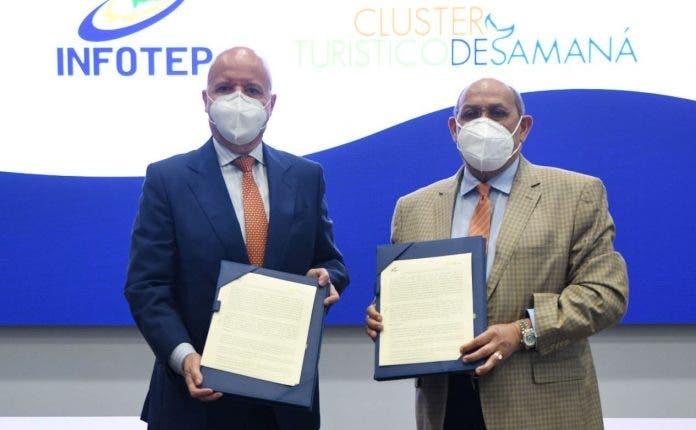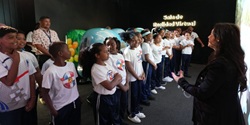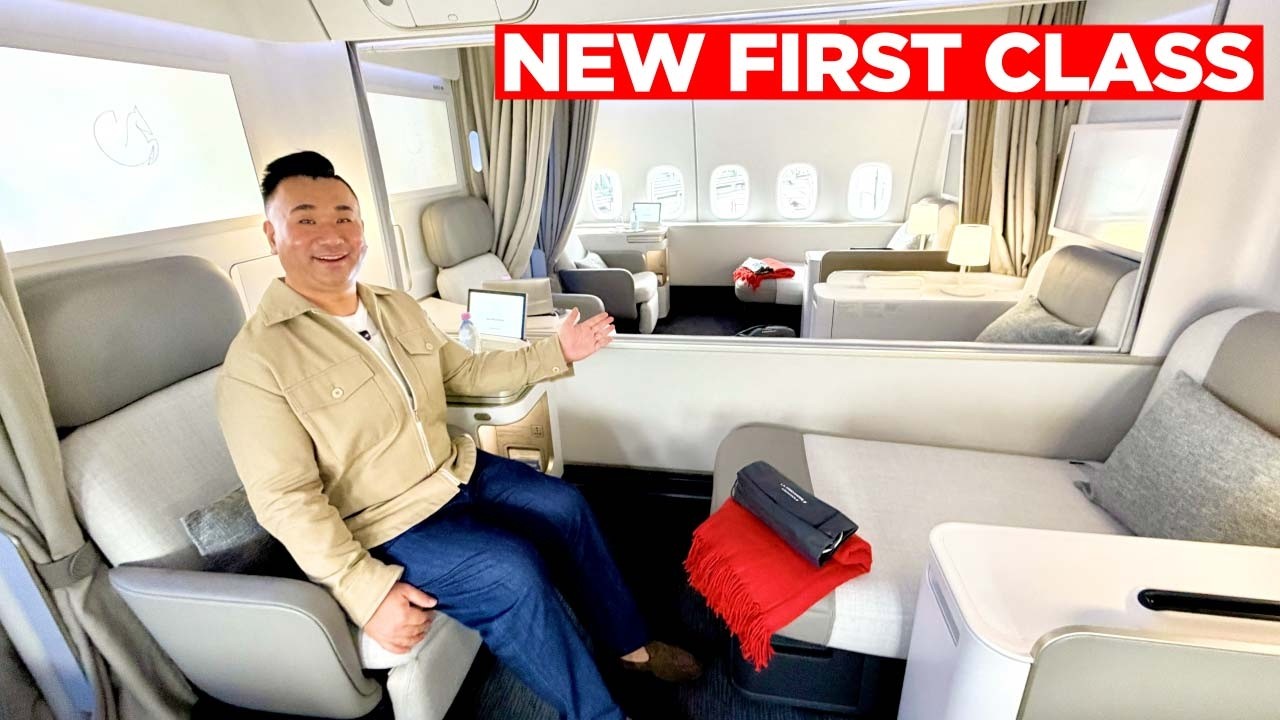Con el propósito de impulsar la productividad y competitividad
Infotep capacitará capital humano para el sector hotelero de Samaná
Temas relacionados: Andrés Marranzini, Asonahores, Clúster Turístico de Samaná, INFOTEP, Jesús Durán, Luis Abinader, Rafael Blanco Tejera, Rafael Santos Badía, República Dominicana
4 febrero, 2021
 1 comentario
1 comentario
El Instituto Nacional de Formación Técnico Profesional (Infotep) y el Clúster Turístico de Samaná llevarán a cabo un amplio programa de formación y especialización del capital humano en la referida provincia y la región, en sentido general, con el propósito de impulsar la productividad y competitividad del sector turístico.
 La ejecución de dicho programa forma parte de un convenio firmado por ambas entidades, a través del cual el Clúster, se compromete, además, a promover entre sus miembros afiliados el pago oportuno y regular de los aportes establecidos en la Ley 116-80 sobre financiación al Infotep.
La ejecución de dicho programa forma parte de un convenio firmado por ambas entidades, a través del cual el Clúster, se compromete, además, a promover entre sus miembros afiliados el pago oportuno y regular de los aportes establecidos en la Ley 116-80 sobre financiación al Infotep.
El director general del Infotep, Rafael Santos Badía, indicó que ambas instituciones arribaron el acuerdo con miras a continuar fortaleciendo la calidad de los servicios de hospitalidad y, no obstante la presente situación sanitaria que experimenta el mundo y República Dominicana, seguir apuntalando el desarrollo de la provincia conforme a los lineamientos trazados por el presidente Luis Abinader.
Explicó que en una primera etapa se prevé desarrollar un plan de capacitación dirigido al personal administrativo, operacional, producción, comercial y de calidad en los servicios, de las empresas del sector turístico de la provincia Samaná, según comunicado de prensa.
De su lado, el presidente del Clúster Turístico de Samaná, Jesús Durán, resaltó la importancia de el acuerdo con el Infotep, ya que la formación, según dijo, es uno de los pilares de esa entidad que agrupa a los propietarios de hoteles de esa paradisíaca provincia.
Dijo que RD debe estar preparado para la “explosión” que surgirá en el mundo a nivel turístico luego que pasen los efectos más duros de la pandemia del Covid-19, por lo que capacitar al personal que tendrá que responder a esa demanda es primordial en estos momentos.
Mediante el nuevo acuerdo, el capital humano de esa zona será formado en las áreas de tecnología; repostería; panadería; idiomas (inglés y francés); protocolos de servicio y atención al cliente frente al Covid-19, técnicas de paisajismo: jardinería y embellecimiento ornamental, higiene y manipulación de alimentos, camareros de bar y restaurante; camarista de piso y ama de llaves; electricidad y plomería básica, construcción para albañiles, mantenimiento de aire acondicionado y eléctrico, terminación de interiores, contabilidad, entre otros.
El acuerdo fue firmado con la presencia del senador de la provincia Samaná, Pedro Catrain, el alcalde de Santa Bárbara, Nelson Núñez, el alcalde de Las Terrenas, Eduardo Esteban Polanco, el alcalde de El Limón, Fernando Mercado, el alcalde de Las Galeras, Cecilio García Javier y el alcalde distrital de Arroyo Barril, Luis Felipe Fermín.
Por el sector empresarial estuvieron el presidente de la Asociación de Hoteles y Turismo de la República Dominicana (Asonahores), Rafael Blanco Tejera, y el vicepresidente de esa entidad, Andrés Marranzini.
Comentarios
Noticias relacionadas
Andrés Marranzini
Turismo, Defensa y PN anuncian plan preventivo por Semana Santa
Asonahores anuncia feria virtual para impulsar reactivación del turismo
Danilo consulta con líderes del sector turismo para reabrir economía
Asonahores
Mitur exhorta a los hoteleros a actualizar sus licencias de operación
Aduanas lanza nuevo ‘Manual del Viajero’
Banco Popular es reconocido por alianza accionaria con Meliá Hotels International
Clúster Turístico de Samaná
Clúster de Samaná realiza programa de formación turística con más de 1,300 estudiantes
Samaná fortalecerá mano de obra para incrementar su oferta sostenible
Abogan por solución del suministro eléctrico de Las Terrenas y El Limón
INFOTEP
Iberostar Hotels se integra al programa de formación dual de Infotep
Clúster de Samaná realiza programa de formación turística con más de 1,300 estudiantes
Realizarán diplomado especializado en turismo de cruceros en Pedernales



















El capital humano es algo muy muy importante para el desarrollo hotelero en la RD y a nivel mundial. Aqui le mando la primera serie de un articulo que salio en la revista online Hotels Magazine señalando la area laboral ahora con el Covid-19 y la importancia de fortalezer el capital humano en esta industria en el futuro.
Esta es la parte primera de cuatro series. Muy interesante y espero que las disfruten.
The Great Reset: Preparing to lead anew
Facebook Tweet LinkedIn Email ShareThis
commentComment
commentemail editors
commentPrint
By Megan Rowe on 2/4/2021
Gearing up for the anticipated revival of travel as the COVID threat recedes isn’t simply a matter of removing Plexiglas dividers, stocking the bar and opening the fitness center. A clean, safe environment is a given at this point – and trust in that safe environment is essential to recovery. Behind that trust: your workforce and the efforts they make to build it.
COVID has redefined what it means to hire, train and motivate a team. How should you be managing your most important asset? Over the next three business days, HOTELS will present three stories on what to expect – from retraining and motivating to how to be the right leader for right now. Here is Part 1 on rehiring, retraining and more.
Rehiring, retraining, recalibrating
Some hotels are hiring no differently than they were in “normal” times. Typically they are giving priority to bringing back furloughed employees, but aside from that they haven’t really changed the definition of a good hire.
“The industry is changing economically because of COVID, but the functions are still the same,” said Scott Webb, president of Kolter Hospitality. The Florida-based developer and management company operated its assets with skeleton crews last year but by late fall had rehired many furloughed workers and was recruiting for a new AC by Marriott in Orlando. “We still need housemen, housekeeping, cooks, front desk clerks. Now it’s just about finding a balance of quality people.”
Others are considering candidates through a different lens.
‘Problem solvers’
“We are looking for associates who are hungry to learn, able to shift gears and adapt to the needs of our guests and we specifically home in on individuals who are versatile and prepared to pivot roles as needed,” said Agnelo Fernandes, chief strategy officer and executive vice president of Terranea Resort in Rancho Palos Verdes, California. “We specifically look for creative problem solvers with a great sense of social intelligence,” he added.
Getty Images
Debra Punke, senior vice president of human capital and communications at North Carolina-based Concord Hospitality, said the pandemic has increased efficiency and the importance of cross-functional roles. As a result, “we will be looking for people who are able to do more than one job.”
Despite high unemployment levels, recruiting for hotel work might be a challenge. “Because hospitality as a whole has been so hard hit, many people who used to work in the industry, if they could, went to work elsewhere where they had more opportunity and stability,” said Judy King, principal of Quality Management Services, an organizational development and training firm.
King said employers need to offer a sense of security and “assurance that they are going to do everything possible to keep a person employed at a reasonable rate and for enough hours to make a living.”
A commitment like that has benefited CitizenM, which limited layoffs and maintained near-normal staffing levels through 2020. “We think those who have stayed with us are so appreciative that we’re hanging in as a company that they aren’t complaining at all — everyone is extremely cooperative, dedicated and involved,” said Michael Levie, vice president of operations at the Amsterdam-based company.
New priorities
If the pandemic has had one silver lining, it’s the ability to reset, not only job functions, but what positions now make sense. “Some hotels are operating with great foresight,” King observed. “They say when we reopen or ramp up, this is a great opportunity to reset or redo; people will be more malleable, more open, particularly if they have been in a position for a long time.”
Ideally some training would come along with the new job description, but tight budgets may not accommodate that.
“It’s an opportunity to run away from what we’ve always done in the past and rethink what we want to do,” Levie agreed. CitizenM hotels have been at the forefront of leveraging technology to keep operations efficient, but the pandemic has pushed that further.
“During COVID, we saw there was a huge request from guests to go touchless. So, we launched an app that allows guests to make reservations, check in and open the guestroom door with their phones. Technology provides for that, but it doesn’t take away the fact that you have to have someone to welcome them and provide some service,” Levie said.
It’s no surprise that many hotels have shifted their training priorities, turning the emphasis toward safety and cross-training.
Don’t cut training
Well before the pandemic, Dorchester Collection launched a growth and development initiative that involved teaching associates different jobs.
“We’re a small company, so we have to be creative to keep people engaged and growing,” said Eugenio Pirri, chief people and culture executive for the nine-hotel luxury group. Today, he said, more than 60% of the staff is trained to handle three or more positions. That foresight helped Dorchester get through the dark days of 2020.
“We have 40 people on a consistent basis who can go help at other hotels,” Pirri said. During 2020, staff from the company’s closed or low-occupancy properties were temporarily assigned to busier hotels to fill in as needed, often doing jobs other than their normal assignments.
COVID hasn’t stopped Dorchester’s training program, either. “During the pandemic, a lot of companies have cut training. Every week our employees have had some kind of training,” Pirri said. And when idled hotels reopened, the company mandated all employees undergo a refresher course. “We did it to remind people that even though we’ve been out of the business, don’t forget who we are, and we explained how we were reopening. You couldn’t return to work without doing it,” he added.
Dorchester heavily emphasized empathy as part of associates’ return-to-work training. “We wanted to get them to understand that what they are going through is what guests are going through,” Pirri said. “People who are going to travel are the people who want to travel, who have decided they want to stay in a hotel, so it’s really important to understand why they are returning and for employees to make sure they feel comfortable in their situation and how they can create the right environment,” he added.